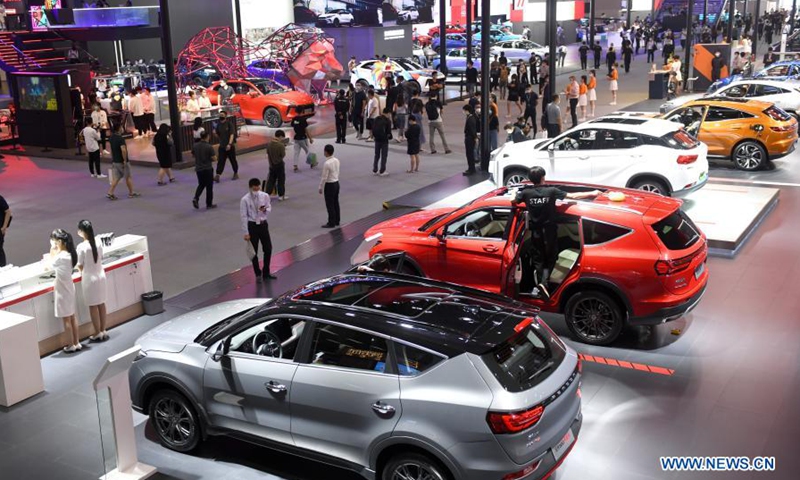Chip shortage threatens car output, but likely temporary: experts
By GT staff reporters Source: Global Times Published: 2020/12/6 21:10:17

People visit the 18th Guangzhou International Automobile Exhibition at the China Import and Export Fair Complex in Guangzhou, south China's Guangdong Province, Nov. 29, 2020. The exhibition concluded here on Sunday. (Xinhua/Lu Hanxin)
Automakers in China are facing uncertainties due to disruptions in chip supply posed by the rising demand for domestically made vehicles and the ongoing global pandemic, which continues to create hurdles to logistics and production, industry insiders said.
Yuguancheshi, a social media platform for the vehicle business, said in a study report on Friday, citing an unidentified source at SAIC Volkswagen, that the company had to stop production due to chip shortages. FAW-Volkswagen will also suspend production any day now, the report said.
The report immediately went viral online, raising concerns over how big the impact will be and how long it will last. Volkswagen confirmed to media the existence of the chip disruption, and said that it is working on the issue closely with business partners.
Xu Ying, head of the public relations department of Volkswagen Group (China), told the Global Times on Sunday that a broad economic recovery in China has further boosted demand, worsening the chip supply situation and putting some car production at risk. Xu said the company is working with partners on the entire whole supply chain to minimize the impact.
"As Volkswagen Group (China), we are closely monitoring the development of the situation, and have also started coordination with the headquarters and relevant suppliers to actively take countermeasures," said Xu, noting that customer deliveries of vehicles are not affected at present.
Volkswagen is not alone. There are chip supply disruptions worldwide due to the ongoing global pandemic, which poses a barrier to resuming demand for vehicles.
The shortage led to the failure of two modules, electronic stabilization programs and electronic control units for on-board computers, said Yuguancheshi.
The main domestic suppliers are Continental group and Bosch, two parts suppliers, which are also facing the risks of chip outages, the report said.
"In Europe and Southeast Asia, production halts by some automotive chip producers has resulted in low run rates in the Chinese auto market," an industry insider surnamed Ji at a car-parts maker told the Global Times on Sunday, adding that the situation will improve in the second quarter of 2021, as vaccine production worldwide is scaling up.
A senior manager surnamed Gu at a Chinese company in the engine management system sector told the Global Times that the sector for vehicles' operating systems is dominated by foreign companies, which prefer using overseas central processing units (CPUs) instead of domestic ones, which has worsened shortages of automotive chips.
"Foreign automotive chipmakers such as Infineon, Freescale and Mitsubishi are dominating the market. Without their supply, the Chinese auto industry may face a crisis," Gu said, except for motorcycle engines, which can immediately use domestically made CPUs.
However, Xu Haidong, assistant secretary of the China Association of Automobile Manufacturers, told the Global Times that some automakers face chip shortages, but they haven't suspended production, and the situation is being over-interpreted by the market.
"The current supply chain shortage will be temporary, given the fact that there is an exaggerated situation that fills the market with panic, but it will have little effect on the price and supply of cars in the market," Cui Dongshu, secretary general of the China Passenger Car Association, told the Global Times.
"There is a shortage of supply, not a complete cut off, and car companies like Volkswagen have adequate chips in stock for at least a month," said Cui, noting that although on-board chips are mainly produced abroad, they can be produced domestically if needed.
These issues would push the supply chains to further complete their structure in China to accommodate the entire process of vehicle production - including chips, experts said.
Posted in: INDUSTRIES